Copyright © 2012–2013 — Robert Kooima
The environment mapping tools are a set of command line utilities that operate upon spherical images in TIFF form. These operations including remapping between common spherical projections and generating diffuse irradiance maps from specular environment maps.
The following header files provide the ICC profiles needed for well-formed floating-point TIFFs.
This code supports reprojection and resampling between any two of the following spherical image projections. A high-resolution example image of each type is included.
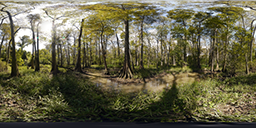 | The rect type corresponds to the equirectangular projection, much like the common map of the world. It represents the full sphere, though with significant distortion near the poles. (Example.) |
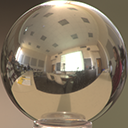 | The ball type corresponds to a photograph of a mirrored sphere, or "light probe". It represents the full sphere, but with significant distortion toward the back. (Example.) |
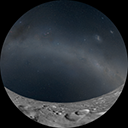 | The dome type gives a "dome master". This is an image suitable for projection onto a fulldome planetarium. The view looks up and the radius varies linearly with latitude. It represents only half of the sphere. (Example.) |
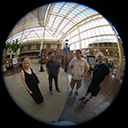 | The hemi type is mathematically identical to the dome type, though the view faces forward instead of up. This corresponds to a photograph taken with an 8mm "fisheye" lens. This too represents only half of the sphere. (Example.) |
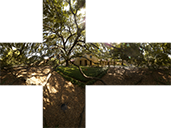 | The cube type corresponds to an OpenGL cube map texture, and is the best choice for use in real-time 3D rendering. The TIFF contains each of the six cube faces in a separate page. The cube faithfully represents the full sphere with minimal distortion. (Example.) |
The output is sampled using one of several sampling patterns, which give a quality-speed tradeoff.
 | cent … One sample at the centroid of the output pixel |
 | rgss … Rotated-grid super sampling |
 | box2 … 2 × 2 super sampling |
 | box3 … 3 × 3 super sampling |
 | box4 … 4 × 4 super sampling |
This tool remaps the input image src.tif to the output dst.tif. The sample depth and format of the input TIFF is preserved in the output.
envremap [-i input] [-o output] [-p pattern] [-f filter] [-n n] src.tif dst.tif
-
-i inputInput projection type. May be
ball,cube,dome,hemi, orrect. The default isrect. -
-o outputOutput projection type. May be
ball,cube,dome,hemi, orrect. The default isrect. -
-p patternOutput sampling pattern. May be
cent,rgss,box2,box3, orbox4. The default isrgss. -
-f filterInput filter type. Maybe
nearestorlinear. The default islinear. -
-n nOutput size. Image will have size
n×n, exceptrectwhich will have size 2n×n.
This tool generates an irradiance environment map from a given environment map using the method of Ramamoorthi and Hanrahan's An Efficient Representation for Irradiance Environment Maps. The input must be a 32-bit floating point TIFF image in cube map format with six pages.
envtoirr [-n n] [-f src.tif] [-ges] dst.tif
-
-n nOutput size. The output will be a 32-bit floating point TIFF with six pages, each
n×nin size. -
-f src.tifInput TIFF file.
-
-g
-e
-sForego loading an input file and instead generate an irradiance map using one of the parameter sets from Ramamoorth and Hanrahan. Options are
-gGrace Cathedral,-eEucalyptus Grove, orsSt. Peter's Basilica.